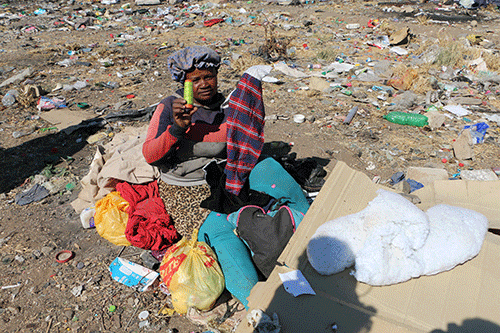Hundreds of people who rely on scavenging at the rubbish dump on the outskirts of Otjiwarongo are pleading with the government to implement long-term sustainable solutions that will alleviate their dependence on garbage for survival.
During a visit by New Era on Friday, it was observed that the majority of scavengers, mostly women and children, were seen running after every truck entering the dumping site. The sprawling mountain of steaming trash stretched as far as the eye could see, with a cloud of flies hovering over decaying vegetables, rags, plastic, and discarded objects. Men and women sifted through the rubbish in search of items they could salvage.
The scavengers expressed their belief that the Namibian government could provide them with basic necessities if proper strategies were implemented to address their long-term needs.
“When President Hage Geingob declared the Covid-19 pandemic a state of emergency, we were not reliant on the dumpsite for survival. We had access to water and food every day, and shelter was provided for those without homes. But now we are left to fend for ourselves, compromising our safety for food,” said 64-year-old Rosa Sumses.
Sumses explained that while they have been surviving off the dumpsite for decades, their lives are no longer safe. Just this year, two fellow scavengers lost their lives while searching for food.
“We are no longer safe, and I believe the government can do better, just as they did during the Covid-19 period. Two of our people were killed by trucks here, and we had to witness their deaths. Even our children have been exposed to these distressing scenes that will haunt them for the rest of their lives,” she said.
Filla Vaniels, another scavenger, while cooking cabbage scraps in a 2-liter can, recounted the incident of a child scavenger who lost his life last month at the dumpsite. She believes that with proper strategies in place, such tragedies could be prevented.
“We don’t want to be here. Circumstances force us because we don’t want to steal and end up in prison. If we were not allowed to scavenge during the lockdown, why can’t those solutions continue so that we won’t have to come here again? This is about our need for food. However, some come here to collect cans for selling,” she explained.
Angel Gawases stated that she visits the dumpsite to collect plastic bottles and cans to sell and generate money for electricity and water.
“I’m only here to make money because I’m unemployed. I need to buy electricity and pay for water. I live in Ombili location with my children, and we survive from this,” she explained.
Cecilia Tjaise, on the other hand, visits the dumpsite to collect old clothes to make pillows.
“I wake up early in the morning to find silk materials that I can use to make pillows. I sell pillows in the local area. I don’t want to be here because I want to use my skills to make money,” she said.
Tjaise expressed her desire for materials to enhance her business so that she can stop relying on the dumpsite.
Years ago, the municipality prohibited residents from scavenging at the dumpsite after a child was run over by a municipal truck. However, the situation remains unchanged.
Shelencial Gaeses, a mother of five, is one of many people foraging for food, scrap metal, and recyclable bottles on a daily basis. Accompanied by her seven-year-old daughter, Gaeses navigates through the heaps, searching for anything useful they can eat or sell to recyclers. Life is challenging for her, and she can only eat if she visits the dumpsite.
Her daughter had to drop out of school earlier this year after they were evicted as illegal settlers in the informal settlement. They have since moved to the outskirts of town, and Gaeses cannot afford transportation to take her daughter to school.
“I have been coming here for almost 10 years, surviving off what I find. I sell metal objects to scrapyards, and last year I started collecting plastic bottles to supplement the N$30 I earn from metal. It helps me pay rent and support my children,” she explained.
A frail-looking woman clutching a tattered green bag caught the attention of the New Era crew. She declined to provide her name.
Covered in dust, revealed that she has been scavenging at the dumpsite for the past two months. She left her family in the northern parts of the country and came to Otjiwarongo in search of better opportunities. Unemployed and not yet eligible for a pension grant, she collects plastic bottles, earning about N$30.
“It helps me buy bread and body lotion,” she said with a shrug. Without any other means of income, she and others arrive at the dumpsite as early as 06h00 and stay until late afternoon.
Merlene Mbakera, the regional councillor of Otjiwarongo, explained that the government only provides food to scavengers during emergencies. However, she acknowledged that these occasional provisions are not enough for their long-term survival.
“These people lack long-term sustainability, and some have become addicted to scavenging. Last year, two women expressed their desire for training when I accompanied you to the site. I provided them with training, but they still return to the dumpsite,” she said.
When approached for comment, governor James Uerikua mentioned that dumpsites exist worldwide, and people visit them for various reasons. However, he did not provide further details, requesting that New Era approach him the next day. Despite attempts to reach him, he did not respond to calls or messages.
- ljason@nepc.com.na


